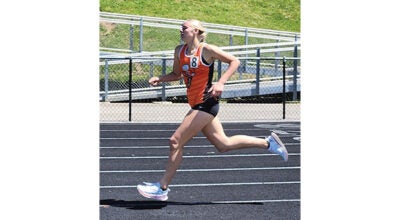Nurmi set 2 Olympic records within an hour at 1924 Games
Published 1:49 pm Wednesday, July 29, 2020
|
Getting your Trinity Audio player ready...
|
BY CHRIS LEHOURITES
AP SPORTS WRITER
Less than an hour after setting an Olympic record in the 1,500-meter race at the 1924 Paris Games, Paavo Nurmi set an Olympic record in the 5,000.
Two races and two gold medals in one hour — and then the “Phantom Finn” went dancing to relax.
“We lived in a house near to the Colombes stadium, on the edge of the city,” Nurmi said in a 1971 interview with a Finnish journalist. “On the evening after I’d won the 1,500 and the 5,000 on the same day, I went dancing at a nightclub in Montmartre.
“One of the Finnish journalists was surprised to see me there, but dancing was a good way of winding down after a hard day’s running on the track.”
Two days later, amid a heatwave, Nurmi won two more gold medals — in the same race. He won the cross-country event and led Finland to the team gold medal.
More than half of the starters failed to complete the race because of the hot conditions, with only 15 of the nearly 40 runners crossing the finish line.
“Greater even than his unprecedented capture of two finals the same afternoon, last Thursday, was Nurmi’s achievement today, for the Finnish cyclone proved his stamina as well as his speed, where his rivals faltered under the pace and fell like leaves by the wayside in probably the most spectacular Olympic race ever witnessed,” The Associated Press wrote in its report from the games.
Nurmi, who died in 1973, is perhaps the greatest of the Finnish distance runners, known as the “Flying Finns.” Inspired by 1912 Olympic great Hannes Kolehmainen, Nurmi won three gold medals at the 1920 Antwerp Games, five in Paris and one more in Amsterdam in 1928.
His individual gold medal from Antwerp and his lone gold medal in Amsterdam came in the 10,000 meters, the longest race on the track. It was an event he originally wanted to add to his already packed program in Paris.
“Six months beforehand, I had decided to take part in all the Olympic races between 1,500 and 10,000,” Nurmi said in the 1971 interview, republished in 2012 in the official history book of the Olympics.
“The team leaders, worried that I would be taxing myself, told me to forget about the 10,000, though I still think I would have been fit enough to win that race as well.”
Instead, Nurmi had to settle for gold medals in the 1,500, 5,000, and cross-country races in Paris, as well as the 3,000 and cross-country team events.
His teammate, Ville Ritola, did almost as well. He won four gold medals, the two team events alongside Nurmi as well as the 10,000 and the steeplechase.
The only other person to earn two Olympic gold medals in separate running races on the same day was Chandra Cheeseborough, an American who was part of the winning 4×100 and 4×400 relay teams at the 1984 Los Angeles Games.
Nurmi was one of 12 children born into a poor family, according to Olympic historian David Miller. His father died when he was 12.
“He was solitary and uncommunicative, training alone to a self-devised program in which the content and timing were calculated to the last degree: the first example of the benefits to be obtained by interval training, mixing endurance and speed work, which would become fashionable 50 years or more later,” Miller wrote in his history book.
Nurmi had hoped to run in the marathon at the 1932 Los Angeles Olympics, but he was banned from international competition after being accused of being a professional. Prize money, however, didn’t seem to be the thing that inspired him.
“On his way to the top, a runner must have ambition together with an iron will,” Nurmi said. “Money does not make a runner, but a deep desire from within.”





